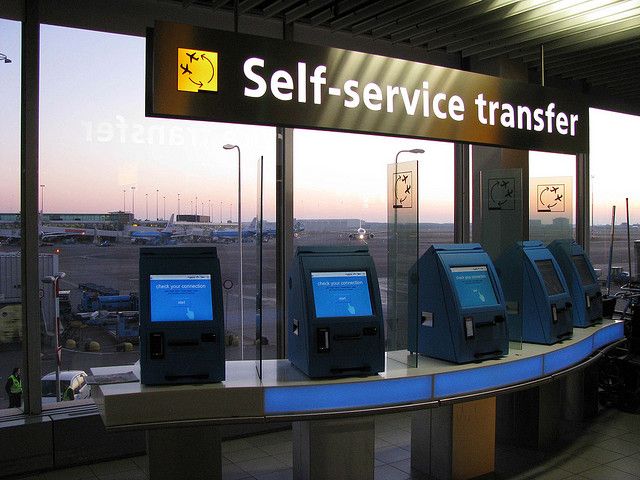Some rights reserved by reservasdecoches
When I first started out on my career path in the world of communications, I was given a very sound piece of advice that has stuck with me (and actually forms the very core of why I’m in this field at all):
‘Always remember that people do business with people!’
If you consider all of the things that make a consumer feel content or ‘safe’ in their purchasing decisions (be it a product or service), many will derive from the qualities that a person can add to the transaction. In addition to this, it is only people that can actually convey emotion and fundamentally change the purchasing experience for the purchaser.
So why is it, in a competitive marketplace where consumers are inundated with options and brands need to retain customer loyalty, companies place so much emphasis on removing this key point of contact?
Examples may help here:
– Self-checkout points in the supermarket – manned by staff who (if you are lucky) may wander over and grunt at you if you require assistance
– Self-service bag drop points at airports – manned by staff who grunt at you if you require assistance
– Self-service ticket machines at train stations – often unmanned, but when they are, by staff who grunt at you if you require assistance
– Automated messages when you call to speak to a service provider – no matter how hard you try you will never get through to a human being who can grunt at you for requiring assistance!
I’m all for technology (I’d be out of a job if I wasn’t!) but there comes a point when it actually eradicates the need for the longest-standing communication mechanism of all time……talking to people! It also seems to make the people who ‘support’ the technology resent the fact that their interpersonal skills are not required.
I decided to ask some friends about this topic (as I may come across here as quite old and bitter!) and their feedback was very interesting:
“For me, face to face customer service is paramount and I advocate great customer service experiences every day. Customer service should be at the forefront of every business and I truly believe that a good customer service experience can only be achieved through face-to-face interaction… you can’t beat being able to assess in-the-moment reactions, the ability to develop relationships and genuine familiarity.”
“I worry that the whole ‘self-service’ thing is going to put people out of jobs and I’d hate to think that I was contributing to that. Plus it’s always nice to speak to someone and exchange pleasantries!”
“I think my biggest gripe with this is it makes the staff that are there lazy or rude. I don’t have a problem checking myself in etc., but if I have a problem and I need to speak to someone I hate the attitude you get.”
“My dad went into a bank for some cash where everyone is apparently expected to use an ATM machine. So rather than serve him they insisted on taking him outside to show him how to use the cash machine; not happy.”
So, maybe I’m not old and bitter but merely speaking up for those of us who value good customer service.
As a final thought, one response I received perhaps finds that happy medium between sound technology and good customer service:
“I recently bought a video monitor online; the website kept malfunctioning at the same point in the transaction and the deal kept failing to complete. I clicked on ‘live chat’ and immediately got into a proper dialogue with a real person, who recognised the problem, solved it and was charming. I started off being irritated with the website, but ended up being impressed with the company. If customer service is really good, it can turn around negative situations. In this instance, it was obviously a ‘real person’ reacting to a real situation, not giving me a list of options and asking me to choose one (a system that encourages me to switch off and go elsewhere).”
Interestingly, it was the person that offered this final response that also gave me that piece of sound advice so many years ago when I began my career…
Always remember that people do business with people!
Perhaps these companies that want us to do the job they used to employ humans for, would do well to remember this.
